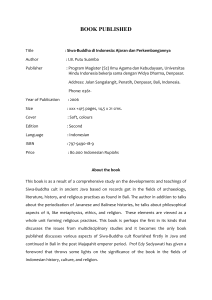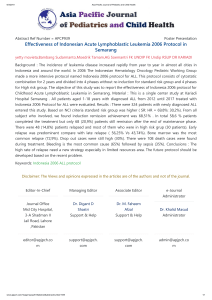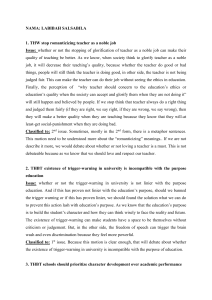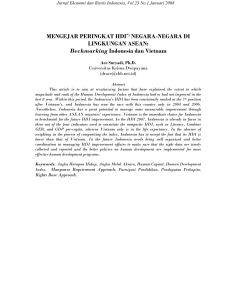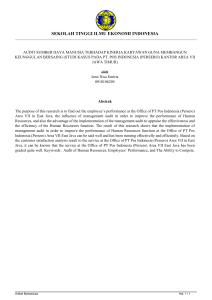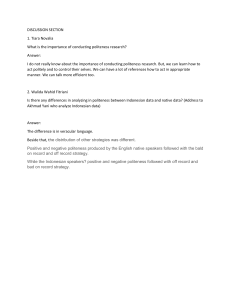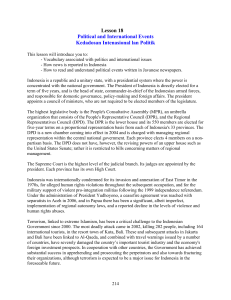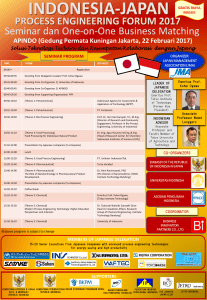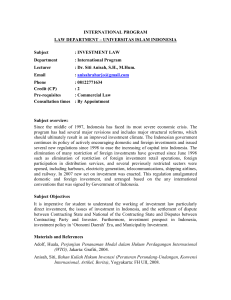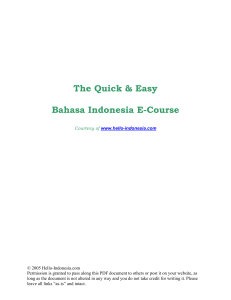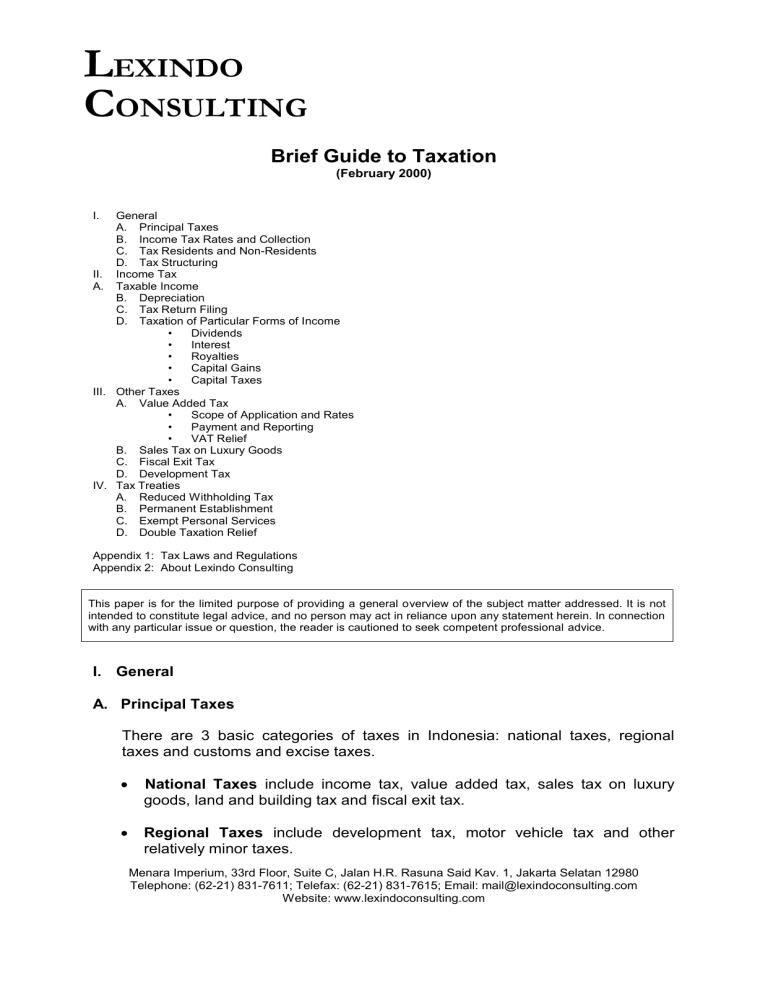
LEXINDO CONSULTING Brief Guide to Taxation (February 2000) I. General A. Principal Taxes B. Income Tax Rates and Collection C. Tax Residents and Non-Residents D. Tax Structuring II. Income Tax A. Taxable Income B. Depreciation C. Tax Return Filing D. Taxation of Particular Forms of Income • Dividends • Interest • Royalties • Capital Gains • Capital Taxes III. Other Taxes A. Value Added Tax • Scope of Application and Rates • Payment and Reporting • VAT Relief B. Sales Tax on Luxury Goods C. Fiscal Exit Tax D. Development Tax IV. Tax Treaties A. Reduced Withholding Tax B. Permanent Establishment C. Exempt Personal Services D. Double Taxation Relief Appendix 1: Tax Laws and Regulations Appendix 2: About Lexindo Consulting This paper is for the limited purpose of providing a general overview of the subject matter addressed. It is not intended to constitute legal advice, and no person may act in reliance upon any statement herein. In connection with any particular issue or question, the reader is cautioned to seek competent professional advice. I. General A. Principal Taxes There are 3 basic categories of taxes in Indonesia: national taxes, regional taxes and customs and excise taxes. National Taxes include income tax, value added tax, sales tax on luxury goods, land and building tax and fiscal exit tax. Regional Taxes include development tax, motor vehicle tax and other relatively minor taxes. Menara Imperium, 33rd Floor, Suite C, Jalan H.R. Rasuna Said Kav. 1, Jakarta Selatan 12980 Telephone: (62-21) 831-7611; Telefax: (62-21) 831-7615; Email: [email protected] Website: www.lexindoconsulting.com Customs and Excise Taxes include import duty, export tax and taxes on certain commodities such as tobacco, alcohol, sugar and gasoline. B. Income Tax Rates and Collection The basic principles of Indonesia’s Income Tax Law (Law No. 10 of 1994) apply to businesses and individuals alike. There is a three-tier rate structure for all taxpayers with a maximum rate of 30% on taxable income over Rp. 50 million. Tax is generally based on self-assessment, but there is an extensive system of domestic withholding taxes to ensure regular and early collection of income tax. There are significant penalties for non-compliance. Special tax rates apply to certain specific types of companies including petroleum companies, mining companies, geothermal companies, foreign drilling companies and non-resident international shipping and airline companies. C. Tax Residents and Non-Residents Resident tax subjects include corporations and other legal entities formed under Indonesian law and individuals resident in Indonesia for 183 or more days in any twelve-month period or present in any tax year with the intention to reside in Indonesia. Non-resident tax subjects are entities or individuals not recognized as a resident tax subject but generating income from Indonesia, including those conducting business in Indonesia through a permanent establishment. A permanent establishment is not necessarily “permanent” nor an “establishment”. Examples of permanent establishments mentioned in the Income Tax Law include a branch office, a representative office, a dependent agent, a construction project, a consulting team, and a dependent person or organization acting in the name of a foreign enterprise. (Note that the holding of shares in an Indonesian company, e.g., in a foreign capital investment (“PMA”) company or through the capital market, does not constitute a permanent establishment.) D. Tax Structuring Consolidated tax returns are not permitted, although inter-company dividends within Indonesia are exempt from income tax. A June 1999 Decree of the Capital Investment Coordinating Board, now reconstituted as the Capital Investment and State-Owned Enterprises Fostering Board (“BPM”) permits the establishment of PMA holding companies, thereby opening up some new tax structuring possibilities even if consolidation is not allowed. As of August 1999, Indonesia has entered into tax treaties with 47 countries, thereby opening up various tax planning opportunities. Direct foreign investments by companies registered in low-tax jurisdictions, such as the Lexindo Consulting © 2000 2 Bahamas and the British Virgin Islands, are also permitted. Mauritius is unique in that it is both a low-tax jurisdiction and a tax-treaty partner of Indonesia. II. Income Tax A. Taxable Income Taxable Income includes virtually any “increase in economic benefit” received by a taxpayer, including wages, profits, prizes, gifts and capital gains. Tax residents are taxed on world-wide income (whether or not remitted to Indonesia), although the tax authorities still lack the resources to effectively monitor and enforce full compliance where offshore income is involved. Non-residents are taxed only on Indonesian-source income, including income attributable to “permanent establishments” in Indonesia. Most normal types of business deductions are permitted, except charitable contributions. Standard deductions apply for individuals. In-kind benefits are not treated as taxable income to the employee, but are not deductible by the company. Generally, losses may be carried forward for up to five years, but may not be carried back. B. Depreciation Fixed assets, other than buildings, may be depreciated using either the straightline method or declining-balance method. Buildings must be depreciated on a straight-line basis. The depreciation method adopted must be consistently applied. Depreciation rates are set according to the category of depreciable asset. Set out in the inset box is a summary of the asset categories and depreciation rates of general application. There are separate lists of assets and depreciation rates for the oil and gas industry, and special depreciation options apply for investors in remote areas. C. Tax Return Filing Taxpayers must prepare both monthly and annual returns. Monthly returns must be filed by the 20th day of each month for corporate tax, employee income tax, VAT and withholding taxes. Annual returns must be submitted within three months after the end of the financial year. Lexindo Consulting © 2000 3 E. Asset Categories and Depreciation Rates Category 1: Assets with a beneficial life of up to four years, e.g., wooden furniture, office equipment, certain transport vehicles and special tools, 50% (declining-balance) or 25% (straight-line). Category 2: Assets with a beneficial life of up to eight years, e.g., metal furniture and equipment, air conditioners, cars, buses, containers, light industrial machinery, computers, printers, scanners, certain heavy vehicles, 25% (declining-balance) or 12.5% (straight-line). Category 3: Assets with a beneficial life of up to 16 years, e.g., hard mineral mining machinery, textile and chemical industry machinery, heavy equipment, piers and vessels for transportation and communication, and other assets not included in other categories, 12.5% (declining-balance) or 6.25% (straight-line). Category 4: Assets with a beneficial life of up to 20 years, e.g., heavy machinery for construction, heavy vessels and piers, locomotives, railway coaches, 10% (decliningbalance) or 5% (straight-line). Permanent Buildings: Buildings with a useful life of up to 20 years as determined by the Minister of Finance, 5% (straight-line). Non-permanent Buildings: Buildings with a useful life of up to 10 years as determined by the Minister of Finance, 10% (straight-line). D. Taxation of Particular Forms of Income Dividends: Withholding tax applies to dividends paid by Indonesian corporations. An important exception is domestic inter-corporate dividends, on which no withholding tax is imposed. If the recipient is a resident individual or non-corporate entity, the rate is 15% and represents an advance against the taxpayer’s annual income tax. If the recipient is a nonresident, the rate is 20% (subject to applicable tax treaty) and the tax is considered final. Interest: Interest paid by resident borrowers to resident banks or financial institutions is exempt from tax. Interest paid to offshore lenders is subject to 20% withholding tax (subject to applicable tax treaty). Royalties: If the royalty recipient is a resident taxpayer, tax is withheld at the rate of 15%. If the recipient is a non-resident, tax is withheld at the rate of 20% (subject to applicable tax treaty). Capital Gains: Capital gains are generally taxable as ordinary income and capital losses are tax deductible. Special rules apply for publicly traded shares. Lexindo Consulting © 2000 4 Capital Taxes: Other than land and building tax, Indonesia imposes no tax on the capital or assets of companies or individuals, although annual tax returns require disclosure of assets. III. Other Taxes A. Value Added Tax Scope of Application and Rates: VAT is imposed upon the delivery of most categories of goods and services within Indonesia. The basic VAT rate is 10%. Imports are generally subject to VAT at a rate of 10%, but exports are effectively exempted from VAT by application of a 0% rate. Raw land transfers do not attract VAT, but land prepared for residential or industrial estate development is subject to VAT at 8%. Payment and Reporting: VAT liability arises at the time of delivery of the goods or services, or upon receipt of payment, whichever is earlier. As a practical matter, the date of the tax invoice (faktur pajak) is used to determine when tax liability arises. The taxable individual or corporation must issue the tax invoice no later than the end of the month following the month of delivery or payment. A monthly return of all taxable purchases and sales must be filed by the 20th of each month. If output VAT is greater than input VAT, the net difference is payable to the tax office. In practice, payment of tax may be delayed up to a maximum of 75 days following the date of delivery. If input VAT is greater than output VAT, the excess may be carried over to the following month to offset against that next month’s output VAT. In principle, the excess of input VAT over output VAT may be refunded once a year, although actual collection may by difficult and/or time-consuming. VAT Relief: Various means of reducing the burden of VAT have been introduced. Deliveries of goods into bonded zones are VAT-exempt, as are goods and services for foreign aid projects, sales of cattle and poultry feed, and the import of certain specified goods and services. Services in certain sectors have been specifically exempted from VAT, e.g., services related to medical and health care, social welfare activities, banking and insurance, radio and television broadcasting, telephone and telegram services, educational and religious activities, public transportation, postage, manpower supply, and hotel accommodations. Additionally, deferrals of VAT are available to PMA and domestic capital investment (PMDN) companies on the import of Masterlist equipment, machinery and raw materials used in the production process. Presidential Decree No. 37 of 1998 provides for a VAT exemption on the transfer of capital goods in the form of machinery and factory equipment. Lexindo Consulting © 2000 5 Under the Bapeksta facility created by Minister of Finance Decree No. 615/KMK.01/1997, production companies may import raw materials free of VAT, Sales Tax on Luxury Goods and import duties, provided that such raw materials are processed and re-exported. Additionally, under the so-called PET facility (Perusahaan Eksportir Tertentu) established by the Minister of Industry and Trade and the Minister of Finance, specially designated exporting companies are granted a facility to purchase certain types of locally sourced basic and auxiliary materials on a VAT-free basis. B. Sales Tax on Luxury Goods Sales Tax on Luxury Goods is imposed at rates from 10% to 50% on a wide range of both imported and local luxury goods. Luxury houses, apartments, condominiums and townhouses are subject to 10% Sales Tax on Luxury Goods. C. Fiscal Exit Tax Every Indonesian resident departing Indonesia by air is required to pay a Rp. 1 million “Fiscal Exit Tax”, with limited exceptions. D. Development Tax Development Tax is a municipal tax intended to aid the development of cities. Where applicable, it is levied at the rate of 10% on restaurant bills. There is also a tourism development tax of an extra 2% on the service charge imposed by some hotels and restaurants. IV. Tax Treaties Indonesia has ratified tax treaties with 47 countries, and others are under negotiation. Several older treaties are being renegotiated. In general, the modern tax treaties of Indonesia borrow freely from the OECD and UN model tax treaties. Tax treaties normally contain the following types of provisions: A. Reduced Withholding Tax: The normal withholding tax rate of 20% on dividends, interests, royalties and certain types of fees is generally reduced to 10% or 15%. B. Permanent Establishment: The typical treaty definition of a permanent establishment is more narrow than that contained in the Indonesian Income Tax Law. C. Exempt Personal Services: Short-term visiting executives deriving employment income in Indonesia may be exempted from Indonesian income tax if certain conditions are met. Entertainers and athletes, however, are not normally covered by such provisions and are subject to Indonesian income tax on Indonesian earnings. Lexindo Consulting © 2000 6 D. Double Taxation Relief: Where provisions of a tax treaty allow income to be taxed in both signatory countries, normally a foreign tax credit is allowed to avoid double taxation. Enforcement of the terms of tax treaties has sometimes proven difficult in Indonesia. Parties seeking to obtain benefits under tax treaties should apply for prior approval of the reduced withholding taxes to which they are entitled by submitting a statement of domicile from the tax authority in the non-resident’s country of domicile. Lexindo Consulting © 2000 7 Appendix 1 Tax Laws and Regulations Major Indonesian laws and regulations relating to tax are listed below. This list does not purport to be complete and is offered as a basic reference list only. In some instances the title of the law or regulation has been edited for ease of expression. a. Law No. 9 of 1994 regarding General Provisions and Procedures on Taxation (November 9, 1994) b. Law No. 10 of 1994 regarding Income Tax (November 9, 1994) c. Law No. 11 of 1994 regarding Value Added Tax on Goods and Services and Sales Tax on Luxury Goods (November 9, 1994) d. Law No. 12 of 1994 regarding Tax on Land and Buildings (November 9, 1994) e. Government Regulation No. 3 of 1994 regarding Payment of Income Tax in the Current Year on Income from the Transfer of Titles to Land or Titles to Land and Buildings (March 2, 1994) f. Government Regulation No. 12 of 1994 regarding Determination of Rates of Taxable Transaction Values for Tax on Land and Buildings (March 18, 1994) g. Government Regulation No. 50 of 1994 regarding Value Added Tax on Goods and Services and Sales Tax on Luxury Goods (December 28, 1994) h. Government Regulation No. 27 of 1996 regarding Payment of Income Tax on Income from the Transfer of Titles to Land and/or Buildings (April 16, 1996) i. Presidential Decree No. 37 of 1998 regarding Government-Borne Value Added Tax on the Import and Delivery/Provision of Taxable Goods and Taxable Services (March 9, 1998) j. Minister of Finance Decree No. 615/KMK.01/1997 regarding Exemption and Restitution of Import Duty and/or Excise and the Non-Imposition of Value Added Tax and Sales Tax on Luxury Goods on the Import of Goods and/or Materials for Further Processing, Assembling or Installing in Other Goods for Export (December 1, 1997) k. Minister of Industry and Trade Decree No. 14/MPP/Kep/1/1998 regarding the Criteria for and the Stipulation of Designated Exporting Companies (PET) (January 19, 1998) Lexindo Consulting © 2000 8 Appendix 2 About Lexindo Consulting P.T. Lexindo Mitra Consulting is an Indonesian limited liability company established under the Foreign Investment Law of 1967, providing professional advice and assistance to the business and investment community in Indonesia. Lexindo Consulting advises clients on all types of business, corporate, banking, investment, finance and commercial transactions. We provide specialized professional services in structuring direct foreign investments as well as other types of cross-border business and investment arrangements. We assist clients in the licensing process and in negotiations with prospective partners, financial institutions and regulatory officials. Lastly, we prepare transactional documentation that clearly, correctly and completely memorializes agreements reached by the parties. Through our understanding of the business, legal, regulatory and cultural environment of Indonesia, we are able to offer clients effective and pragmatic services, ranging from the smooth processing of investment applications to the formulation of innovative solutions to unexpected complications. Above all, Lexindo Consulting is committed to providing our clients with prompt, responsive and high-quality services in the most cost-efficient manner possible. In an investment climate frequently characterized by ambiguity, vagueness and ethical concerns, we take pride in our reputation for directness, clarity and integrity. The firm’s clients include both publicly traded and privately held corporations from Australia, Canada, Hong Kong, India, Indonesia, the Netherlands, Singapore, the United Kingdom and the United States, among others. Clients of the firm are engaged in the fields of manufacturing, oil and gas, telecommunications, information technology, maritime support services, pharmaceuticals, agrochemicals, accountancy, hotel and tourism, agriculture, health care and water treatment. Publications The firm has prepared the following publications, available upon request by our clients and correspondents. Brief Guide To Foreign Investment Brief Guide To The Liability of Directors, Commissioners and Shareholders under The Indonesian Company Law of 1995 Brief Guide To PMA Company Formation Procedures Brief Guide To Real Property Brief Guide To Taxation Useful Reference Information Outline Summary of Indonesian Company Law (Law No. 1 of 1995) (English and Indonesian versions) Additionally, the firm prepares and distributes periodic updates of areas of interest to our clients. Lexindo Consulting © 2000 9 Members of Lexindo Consulting PRINCIPAL Eugene V. Flynn (February 23, 1952) is the founder and director of Lexindo Consulting. Mr. Flynn has worked in Asia (Indonesia and Korea) for 15 years, specializing in foreign investment, corporate, commercial and financial matters. He has professional experience with firms in New York, Los Angeles, San Francisco, Seoul and Jakarta, and is a recognized expert in cross-border investments and transactions. Mr. Flynn is a 1978 graduate of the University of California, Hastings College of the Law, where he was a founder and editor of the Hastings International and Comparative Law Review. He is an Adjunct Professor of Law at the University of San Francisco, and is an active member of several business and professional organizations in Indonesia and abroad. His most recent publication, Multimedia Services in Indonesia: A Regulatory Overview, appears in the October 2000 issue of e-Law Asia. Languages: English and Indonesian. Primary Practice Areas: Corporate Acquisitions, Infrastructure Projects & Privatizations, e-Commerce, Foreign Investment, Corporate Debt Restructuring, Licensing & Franchising, International Tax and Cross-Border Transactions. ADVISOR Robert Hygrell (March 28, 1968): Education: Faculty of Law, University of Uppsala, Sweden (LL.M., 1997); Visiting Scholar in Indonesian Language and Law, Universitas Gadjah Mada (1996-1997). Experience: Praktikant (Intern), Swedish Embassy, Jakarta (1998); Furir (Sergeant), Royal Swedish Army (1988-89). Distinction: Erasmus Scholarship in the field of law, University of Antwerp, Belgium (1996-97). Languages: English, Swedish, Indonesian, Spanish. Primary Practice Areas: Foreign Investment, Land Use & Real Estate, Licensing & Franchising, Antitrust, Corporate Acquisitions, e-Commerce and Infrastructure Projects & Privatizations. ASSOCIATES Ratna Wulan (August 10, 1973): Education: Faculty of Law, University of Indonesia, Jakarta (S.H., 1996); Course Work, University of Western Australia (1997); Notarial Specification Program, Faculty of Law, University of Indonesia (anticipated completion 2001). Distinctions: Top Student Achievement Award, Faculty of Law, University of Indonesia (1996); Department of Education and Culture Scholarship (1994-96). Languages: English, Indonesian and Sundanese. Primary Practice Areas: Land Use & Real Estate, Corporate Securities, Corporate Acquisitions, Foreign Investment, Intellectual Property, and Islamic Banking. Lusiani Julia (November 12, 1975): Education: Faculty of Law, University of Indonesia, Jakarta (S.H., 1998). Distinction: Persatuan Golf Alumni Scholarship (1996-97). Languages: English and Indonesian. Primary Practice Areas: Foreign Investment, Land Use & Real Estate, Licensing & Franchising, Offshore Company Formation, Telecommunications, e-Commerce and Employment & Manpower Matters. Lexindo Consulting © 2000 10 Isma Afifah Romani (January 4, 1975): Education: Faculty of Law, University of Indonesia, Jakarta (S.H., 1998); Notarial Masters Program, Faculty of Law, University of Indonesia (anticipated completion 2002). Distinction: Yayasan Toyota Astra Scholarship (1996-98). Languages: English, Indonesian and Javanese. Primary Practice Areas: Infrastructure Projects & Privatizations, Corporate Securities, Trade & Distribution Arrangements and Foreign Investment. Virginia Joy Tampi (October 17, 1974): Education: University of Buckingham, United Kingdom (B.Sc. (Econ.), 1996; LL.B. (Hons.), 1998). Experience: Assistant Manager, Treasury Division of major Indonesian bank (1999 - 2000). Languages: English, Indonesian and Manadonese. Primary Practice Areas: Foreign Investment, Corporate Acquisitions, Corporate Secretary, International Tax and Banking & Finance. Endah Sari Prasetyorini (September 2, 1975): Education: Faculty of Law, University of Indonesia, Jakarta (S.H., 1998). Languages: English and Indonesian. Primary Practice Areas: Trade & Distribution Arrangements, Foreign Investment, Corporations, e-Commerce and Dispute Resolution. Hapsari Sulistyorini (April 9, 1978): Education: Faculty of Law, University of Indonesia, Jakarta (S.H., 2000). Languages: English and Indonesian. Primary Practice Areas: Foreign Investment, Intellectual Property, Corporate Secretary and Employment & Manpower Matters. Nurtiambun P. Sidabutar (February 26, 1975): Education: Krisnadwipayana University, Jakarta (S.H., 1998); The University of Melbourne, Australia (LL.M., 2000). Languages: English and Indonesian. Primary Practice Areas: Foreign Investment, Commercial Law and Financial Transactions. Lexindo Consulting © 2000 11
